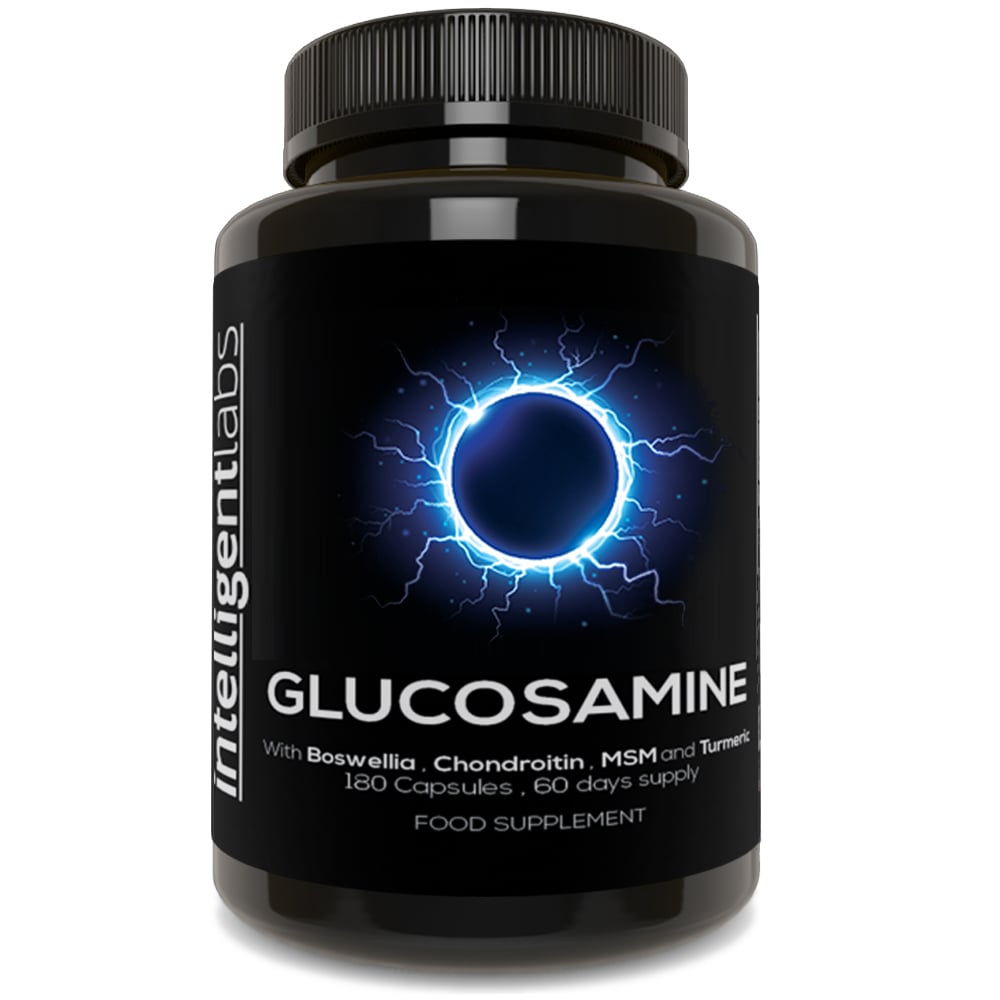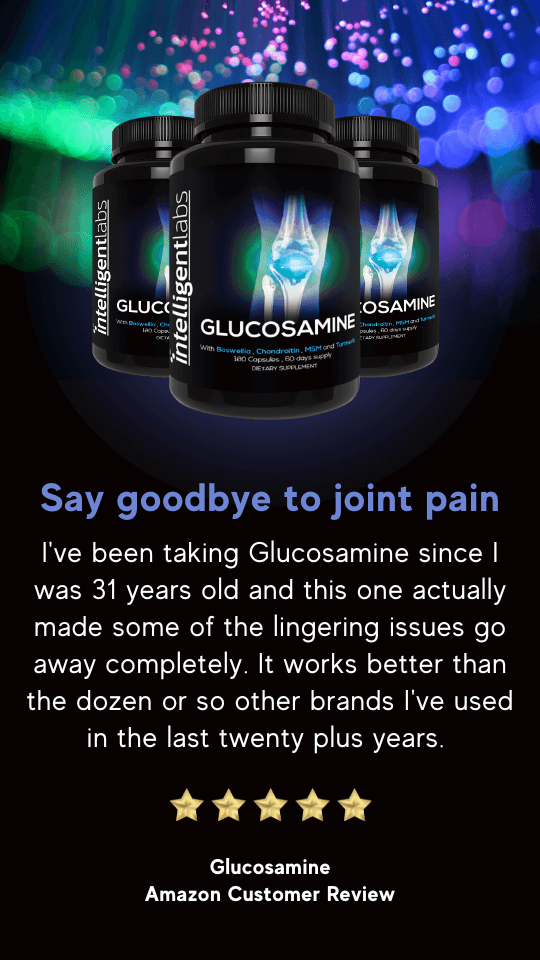Joint pain signals something’s off with your body. It varies from a nagging ache to a sharp pain that makes you think twice about moving too much! Fortunately, joint supplements such as our Glucosamine Complex, may help relieve pain and discomfort. They’re a great alternative to standard drugs used for chronic joint pain, which often cause side effects especially when taken long-term.1
Table of Contents
Who Takes Joint Supplements?
According to Wilson, around 62.5% of adults with arthritis take at least one dietary supplement. 15.1% of these adults specifically take supplements like glucosamine and/or chondroitin to support joint health.2
People often use non-steroidal anti-inflammatory drugs (NSAIDs) because they effectively decrease arthritic pain, but they also come with well-known side effects. Most sufferers prefer to avoid opioids and intra-articular injections.
Joint support supplements, such as our Glucosamine Complex, offer a natural approach to managing joint health. We’ve formulated it with the perfect blend of glycosaminoglycans and other ingredients to support joints, helping to rebuild them, lessen pain, and improve mobility.
What is a Glucosamine Joint Supplement?
Glucosamine ranks among the top choices for joint supplements. It’s a type of amino sugar crucial for creating and maintaining cartilage.

As a supplement, we don’t fully understand how it eases pain and protects cartilage on a molecular level. However, studies show that it likely reduces the production of pro-inflammatory substances that damage cartilage.3
Supportive findings from randomized controlled trials undoubtedly increased the popularity of glucosamine.
For example, the study published in the prestigious scientific journal “Lancet” in 2001 revealed that glucosamine has an impact on the preservation of the joint structure, not just on symptoms in patients with osteoarthritis.4
And What Do You Need To Know About Chondroitin?
Chondroitin, also found in our Glucosamine Complex supplement, is a key ingredient for cartilage formation and is part of the glycosaminoglycans family. It’s usually sold as chondroitin sulfate in over-the-counter supplements.
People have used chondroitin for a long time to treat joint wear and tear. It helps prevent cartilage breakdown and encourages the repair of cartilage tissue.5
This supplement also reduces inflammation and may improve symptoms of osteoarthritis.6 In joints affected by radiologically verified osteoarthritis, chondroitin may slow the narrowing of the joint space, helping to preserve the cartilage. 7
Do Glucosamine and Chondroitin Relieve Osteoarthritis Pain?
Osteoarthritis is a highly prevalent disease. It is estimated that around 10% of men and 18% of women over 60 years of age have the disorder. The prediction is that these percentages would be even higher.8
The development of structural changes within joints eventually result in chronic pain, joint stiffness, decreased mobility and deteriorated quality of life. Osteoarthritis mainly affects the knee, hip, and small hand joints.
The most popular joint supplements for osteoarthritis, glucosamine and chondroitin, aim to prevent further degradation of cartilage and improve symptoms.
The results of scientific studies reveal very different conclusions about the effectiveness of glucosamine and chondroitin. Nevertheless, numerous studies support the claim that these two supplements are effective in the management of osteoarthritis.
Some Studies on the Effectiveness of Glucosamine
Japanese scientists, who published results of a systematic review and meta-analysis in the journal “Clinical Rheumatology” in 2018, concluded that glucosamine has the potential to alleviate knee osteoarthritis pain.9
Another systematic review and meta-analysis from 2018 also announced a positive glucosamine effect in reducing osteoarthritis pain.10 The positive role of chondroitin in the management of osteoarthritic pain is also confirmed in the same way, through a systematic review and meta-analysis of joint supplements.11
Related article: Gout vs Osteoarthritis: Causes, Symptoms, and Treatment Options
What Is the Recommended Glucosamine Dose?

The dose of glucosamine sulfate used in the majority of trials is 1500 mg per day. This specific dosage is explicitly recommended in some scientific papers. 12
For managing osteoarthritis pain, splitting this amount into smaller doses throughout the day (e.g. 500mg x 3 times daily) is more effective than taking the full 1500mg at once. (10)
What Is the Recommended Chondroitin Dose?
Unlike glucosamine, the recommended dosage for chondroitin sulfate in joint supplements varies widely across different studies.
For knee osteoarthritis treatment, doses between 800 and 1200 mg per day have been commonly suggested.13
However, recent findings suggest that a lower dose (180mg/day) for 12 weeks or more may be more effective on improving knee function and daily activities for middle-aged and older adults with knee pain.14
What Are Other Types of Joint Supplements?
The list of joint supplements investigated in scientific studies is quite long and most are considered generally safe.15 Next to the main representatives, glucosamine and chondroitin, these substances also represent ways to treat joint pain, which is why we’ve also added them to our 8-in-1 Glucosamine Complex:
- Boswellia serrata extract
- Turmeric (Curcuma longa)
- Methylsulfonylmethane (MSM)
- Quercetin
- Methionine
- Bromelain
Other compounds which may help support joint health are collagen, passion fruit peel extract, l-carnitine, avocado soybean unsaponifiables (ASU), and diacerein. (15)
All of the above-mentioned joint supplements show analgesic activity in osteoarthritis. Different studies reveal different results for the same compound. Nonetheless, there are many supportive studies related to joint supplements that represent the fact that can’t be overlooked. These substances provide help to many people suffering from chronic joint pain.
Are Joint Supplements Safe?
Many studies highlight the safety of joint supplements like glucosamine and chondroitin. Research on their combined use for osteoarthritis treatment shows these supplements are safe and cause no adverse effects.16
Safety characteristics of joint supplements are compared with those of placebo.17 These safety qualities are particularly important if we have in mind that other drugs used for the symptomatic relief of chronic joint pain are associated with severe side effects (e.g., NSAIDs).
Who Should Be Taking a Glucosamine Joint Supplement?
Joint supplements are key in managing and preventing osteoarthritis, especially for those at high risk.18 For those already affected by osteoarthritis, a supplement like our Glucosamine Complex, may help delay the progression of the disease and ease symptoms.
Treating joint degeneration involves various strategies beyond supplements. Losing weight, if needed, can significantly help, along with targeted exercises, physical therapy, and traditional painkillers, all contribute to managing osteoarthritis symptoms. Check out this guide on how to keep your joints healthy as you age.
References:
- “Painkillers and NSAIDs.” Versus Arthritis, versusarthritis.org/about-arthritis/treatments/drugs/painkillers-and-nsaids/. ↩︎
- Wilson PB. Dietary supplementation is more prevalent among adults with arthritis in the United States population. Complement Ther Med. 2016;29:152-157. ↩︎
- Liu X, Machado GC, Eyles JP, et al. Dietary supplements for treating osteoarthritis: a systematic review and meta-analysis. Br J Sports Med. 2018;52(3):167-175. ↩︎
- Phitak T, Pothacharoen P, Kongtawelert P. Comparison of glucose derivatives effects on cartilage degradation. BMC Musculoskelet Disord. 2010;11:162 ↩︎
- Reginster JY, Deroisy R, Rovati LC, et al. Long-term effects of glucosamine sulphate on osteoarthritis progression: a randomised, placebo-controlled clinical trial. Lancet. 2001;357(9252):251-256. ↩︎
- Tomaszewski W. Chondroitin – application in the treatment of degenerative joint disease. Ortop Traumatol Rehabil. 2016;18(6):621-628 ↩︎
- Bishnoi M, Jain A, Hurkat P, Jain SK. Chondroitin sulphate: a focus on osteoarthritis. Glycoconj J. 2016;33(5):693-705. ↩︎
- Singh JA, Noorbaloochi S, MacDonald R, Maxwell LJ. Chondroitin for osteoarthritis. Cochrane Database Syst Rev. 2015;1:CD005614. ↩︎
- Zhu X, Sang L, Wu D, Rong J, Jiang L. Effectiveness and safety of glucosamine and chondroitin for the treatment of osteoarthritis: a meta-analysis of randomized controlled trials. J Orthop Surg Res. 2018;13:170. ↩︎
- Ogata T, Ideno Y, Akai M, Seichi A, Hagino H, Iwaya T, et al. Effects of glucosamine in patients with osteoarthritis of the knee: a systematic review and meta-analysis. Clin Rheumatol. 2018;37(9):2479-2487. ↩︎
- Knapik JJ, Pope R, Hoedebecke SS, Schram B, Orr R, Lieberman HR. Effects of Oral Glucosamine Sulfate on Osteoarthritis-Related Pain and Joint-Space Changes: Systematic Review and Meta-Analysis. J Spec Oper Med. 2018;18(4):139-147. ↩︎
- Knapik JJ, Pope R, Hoedebecke SS, Schram B, Orr R. Effects of Oral Chondroitin Sulfate on Osteoarthritis-Related Pain and Joint Structural Changes: Systematic Review and Meta-Analysis. J Spec Oper Med. 2019;19(1):113-124. ↩︎
- Hsu CH, Hsu NC, Shih CL, Huang HT, Chen CH, Chou PH. Medication-Taking Habit and Outcome of Glucosamine Sulfate for Osteoarthritis Patients Influenced by National Health Insurance Regulations in Taiwan. J Clin Med. 2019; 8(10):pii: E1734. ↩︎
- Morita M, Yamada K, Date H, Hayakawa K, Sakurai H, Yamada H. Efficacy of Chondroitin Sulfate for Painful Knee Osteoarthritis: A One-Year, Randomized, Double-Blind, Multicenter Clinical Study in Japan. Biol. Pharm. Bull. 2018;1:163–171. ↩︎
- Tsuji T, Yoon J, Kitano N, Okura T, Tanaka K. Effects of N-acetyl glucosamine and chondroitin sulfate supplementation on knee pain and self-reported knee function in middle-aged and older Japanese adults: a randomized, double-blind, placebo-controlled trial. Aging Clin. Exp. Res.,28, 197–205 (2016) ↩︎
- Bottegoni C, Muzzarelli RA, Giovannini F, Busilacchi A, Gigante A. Oral chondroprotection with nutraceuticals made of chondroitin sulphate plus glucosamine sulphate in osteoarthritis. Carbohydr Polym. 2014;109:126-138. ↩︎
- Vangsness CT Jr, Spiker W, Erickson J. A review of evidence-based medicine for glucosamine and chondroitin sulfate use in knee osteoarthritis. Arthroscopy. 2009;25(1):86-94. ↩︎
- Gallagher B, Tjoumakaris FP, Harwood MI, Good RP, Ciccotti MG, Freedman KB. Chondroprotection and the prevention of osteoarthritis progression of the knee: a systematic review of treatment agents. Am J Sports Med.2015;43(3):734-744. ↩︎





